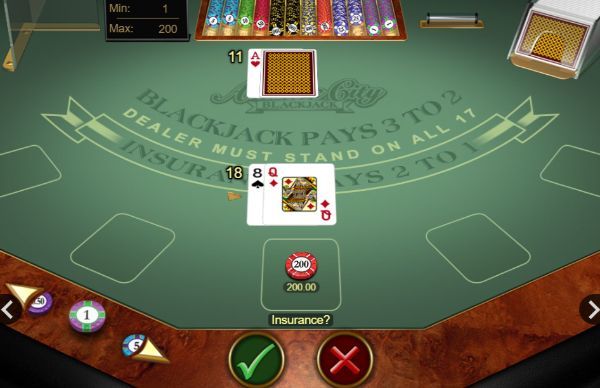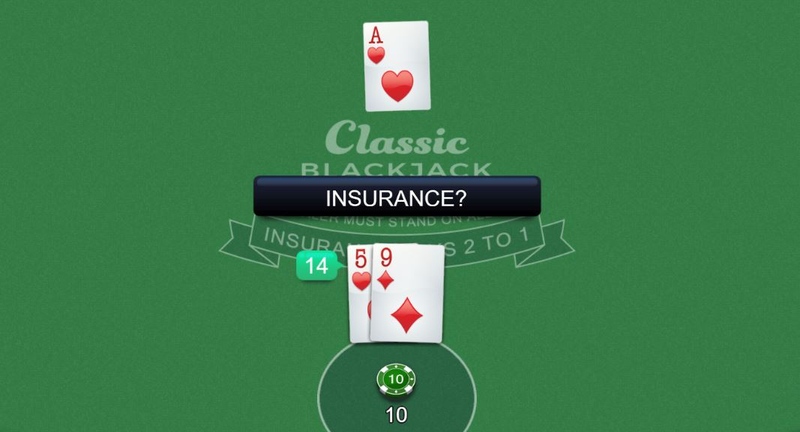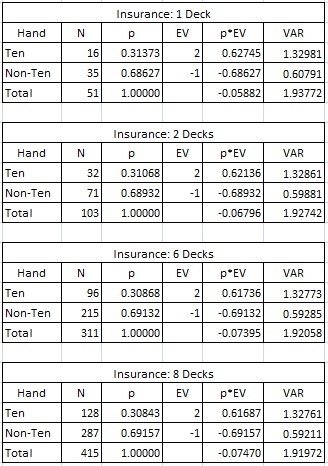A winning insurance wager pays 2 to 1, so the odds are better than that in this hand. The 2 to 1 payout means that the chance of a dealer blackjack needs to be at least 33.3%, and in this example, the chance is 40%. The buy-in for blackjack insurance is usually half the amount of your original bet. For example, if you wager £50 before the dealer shows an Ace, your insurance bet will be £25. Why You Should Take Insurance in Blackjack. Some would argue that taking blackjack insurance is beneficial because you will recover at least half of your original bet. Insurance bets can be made by betting up to half your original bet amount in the insurance betting stripe in front of your bet. The dealer will check to see if he has a 10-value card underneath his Ace, and if he does have Blackjack, your winning Insurance bet will be paid at odds of 2:1. Once all the cards are dealt in blackjack, and if the dealer's face-up card is an ace, players at the table are offered blackjack insurance. The insurance is effectively another wager, usually half the value of your initial bet, and it pays out 2:1 if the dealer reveals his second card is a ten or picture card, making blackjack. Blackjack Insurance is defined as a bet on the odds of probability. There is a one-third probability the second card of the dealer to be a 10. The player loses the Side Bet in case the dealer does not have a Blackjack, but it has yet another chance to turn a profit as the original bet remains valid.
A question I get asked quite frequently by casino players is whether they should take insurance in blackjack. It seems to be something that confuses a lot of people, even among those that fullyunderstand basic strategy and the role that math has to play in blackjack.
When I'm asked this question I usually just give a simple answer (no), but I sometimes feel inclined to expand on this and explain why. I recently did this with a player who asked the question,and for one reason or another he just couldn't seem to accept what I was saying. He was absolutely convinced that the insurance bet is always the right way to go.
My initial reaction was to wonder why he asked me the question in the first place, as he was so sure he knew the correct answer himself. Dragon quest poker tips. My second reaction was to think that I should write a blogpost about taking insurance in blackjack. So here it is! I'll explain exactly what the insurance bet is for any of you who are not familiar with it, and then use some basic math to explain whyit's a bad bet.
Administrator
Is it a good idea to do side bets (e.g. Perfect Pairs - Blackjack, Pot of Gold - Free Bet Blackjack) ever? Is it a good idea to ever take insurance or even money during the course of play? I'm asking this based on using Perfect Basic Strategy throughout the course of play.
Only one that's worked for me IRL is the wheel spin of various structures they have on some BJ tables (e.g. Kustom Kount motorcycle prize, but every spin is at least $50 on a $5 flat bet). The bet depends on getting at least one Ace dealt (even money) and getting a BJ gets you a spin. If you side-count the Aces in the shoe, there is a +EV point sometimes.
I say that as a seldom-BJ player. There are others, and people who know lots more than I do, but that's one example.

I have heard the some side bets (and insurance) can favor the player in certain counts, but I'm not a counter.
Of course, if you're counting cards, the count may OCCASIONALLY suggest you make those bets..

One caveat would be to always take even money if it is offered at a 6-5 table. Note the only place I have seen this is on a cruise ship. But, other than that, all side bets and insurance will carry a higher (sometimes obscenely higher) house edge than the base game.
By my calculation taking even money would reduce house edge by about 6 basis points, which is a very small dent in the 6-5 edge. Bottom line is you still shouldn't play that 6-5 game even if they pay even money insurance. My guess is that the cruise ship didn't mean to give this little break to the players..they just don't understand the reason and ramifications of even money. I even read of casinos that have had 2-1 and 3-1 promotions, not realizing the ramifications until they saw how quickly they began losing big $$.Incidentally, taking even money in a 3:2 game increases house edge by about 1 bip. In my opinion, this is one of those cases where it's alright to go with your gut even though that may not be the highest expected return. I take even money sometimes (on 3/2, I would not be seen at a 6/5 table). It's sort of like playing the pass line when when don't pass has a higher expected return or standing on a hard 16 vs dealer 10. Once you get under a 5 basis point difference it's splitting hairs. It would probably take a few lifetimes of playing for those few bips to make any discernible difference.

Blackjack Odds Explained

I have heard the some side bets (and insurance) can favor the player in certain counts, but I'm not a counter.
Of course, if you're counting cards, the count may OCCASIONALLY suggest you make those bets..
One caveat would be to always take even money if it is offered at a 6-5 table. Note the only place I have seen this is on a cruise ship. But, other than that, all side bets and insurance will carry a higher (sometimes obscenely higher) house edge than the base game.
By my calculation taking even money would reduce house edge by about 6 basis points, which is a very small dent in the 6-5 edge. Bottom line is you still shouldn't play that 6-5 game even if they pay even money insurance. My guess is that the cruise ship didn't mean to give this little break to the players..they just don't understand the reason and ramifications of even money. I even read of casinos that have had 2-1 and 3-1 promotions, not realizing the ramifications until they saw how quickly they began losing big $$.Incidentally, taking even money in a 3:2 game increases house edge by about 1 bip. In my opinion, this is one of those cases where it's alright to go with your gut even though that may not be the highest expected return. I take even money sometimes (on 3/2, I would not be seen at a 6/5 table). It's sort of like playing the pass line when when don't pass has a higher expected return or standing on a hard 16 vs dealer 10. Once you get under a 5 basis point difference it's splitting hairs. It would probably take a few lifetimes of playing for those few bips to make any discernible difference.
